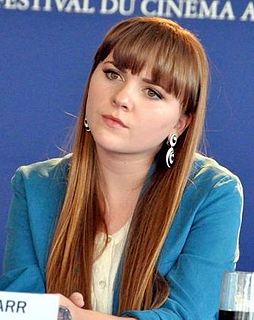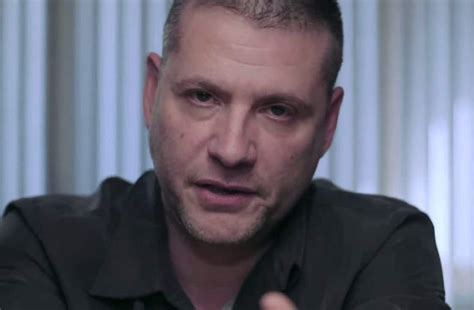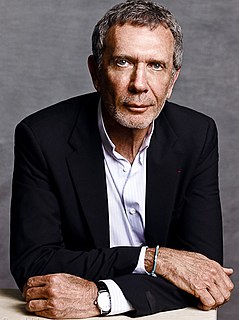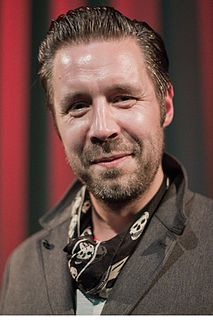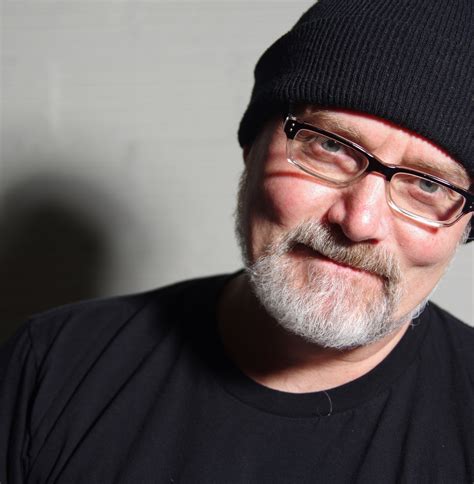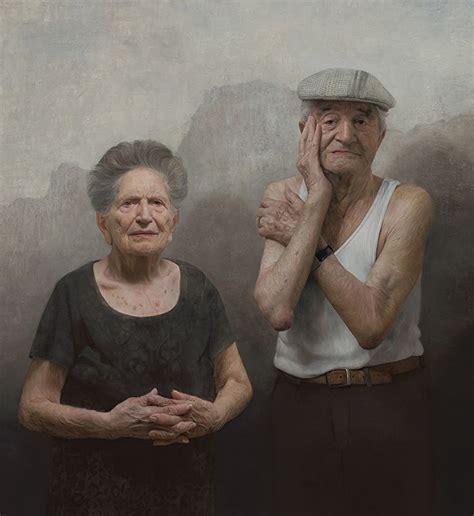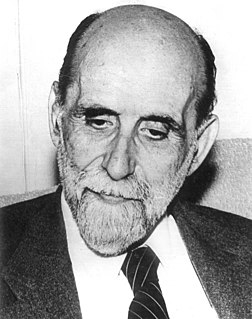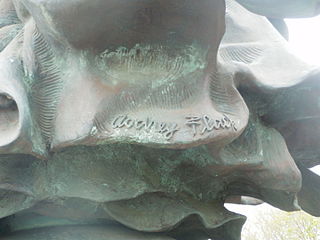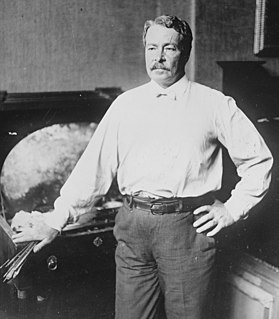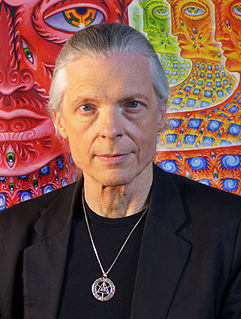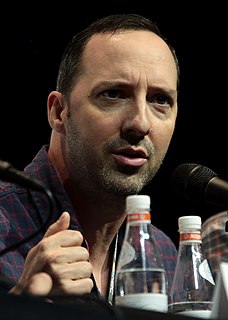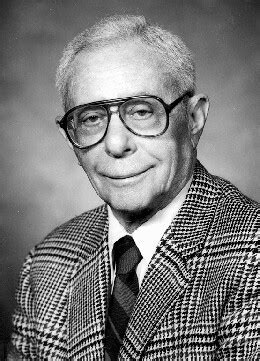Top 821 Idealism And Realism Quotes & Sayings - Page 13
Explore popular Idealism And Realism quotes.
Last updated on April 20, 2025.
You cannot be naïve about evil. You cannot be naïve to the reality that there are human beings and human situations which have totally identified with the dark side of reality. They are malicious. Realism teaches you to put up appropriate boundaries so that people can't do any more evil than possible. But that doesn't mean you do evil back to them.
There is an interesting scientific dispute about realism and optimism. Some find that very optimistic people have benign illusions about themselves. These people may think they have more control, or more skill, than they actually do. Others have found that optimistic people have a good handle on reality. The jury is still out.
So many people think that if you're writing fantasy, it means you can just make everything up as you go. Want to add a dragon? Add a dragon! Want some magic? Throw it in. But the thing is, regardless of whether you're dealing with realism or fantasy, every world has rules. Make sure to establish a natural order.
Sci-fi and horror, particularly, allow a storyteller to depart from, let's say, the demands of cinema verite or kitchen-sink realism or, even, just relatable dramas and can go into areas that are either - in the case of horror - more primally effective or, in the case of sci-fi, more speculative or imaginative.
A political convention is after all not a meeting of a corporation's board of directors; it is a fiesta, a carnival, a pig-rooting, horse-snorting, band-playing, voice-screaming medieval get-together of greed, practical lust, compromised idealism, career-advancement, meeting, feud, vendetta, conciliation, of rabble-rousers, fist fights (as it used to be), embraces, drunks (again as it used to be) and collective rivers of animal sweat.
The core of the film [Hunt for the Wilderpeople] is that relationship. Whether they're getting on or whether they're not. If that relationship works, then everything else works as well. And you kind of almost, sort of, gives into a realm of something like New Zealand magic realism... There is no world in which social work is actually pursues some kid into the woods in this manner.
The industry in Japan moving toward CGI is not as severe and extreme as in the U.S. The animation industry in the U.S. is firing 2D animators and closing those studios, but I think it's possibly because the national traits of the U.S. prefer super-realism. Since Japan is a country that prefers plane vision, I don't think we will leave 2D and substitute hand-drawing with CGI entirely.
There is an idealism associated with poetry I would not dispel but question. It doesn't change anything except within. It shifts your insides around. Poetry is not going to reach the numbers of people by which we commonly consider a large audience. It just isn't a stadium-filler. It could still galvanize people during a crisis, but let's just say there are two points at which poetry is indispensable to people - at the point of love and the point of death. I'll second that emotion.
I love a good comedy, but the slapstick sitcom belly-laugh sort of comedy - the multicam thing - is not really where my interests lie. I'm very interested in single-cam, in intimate portraits. I like it when comedies have a little bit of realism and a little bit of darkness to them. It makes them more palatable and more relatable and grounded.
Modern transcendental idealism, Emersonianism, for instance, also seems to let God evaporate into abstract Ideality. Not a deity in concreto, not a superhuman person, but the immanent divinity in things, the essentially spiritual structure of the universe, is the object of the transcendentalist cult. In that address of the graduating class at Divinity College in 1838 which made Emerson famous, the frank expression of this worship of mere abstract laws was what made the scandal of the performance.
I am opposing it with an idea of the history of philosophy as a history of philosophers, that is, a history of mortal, fragile and limited creatures like you and I. I am against the idea of clean, clearly distinct epochs in the history of philosophy or indeed in anything else. I think that history is always messy, contingent, plural and material. I am against the constant revenge of idealism in how we think about history.
Life is called Samsara - it is the result of the conflicting forces acting upon us. Materialism says, "The voice of freedom is a delusion." Idealism says, "The voice that tells of bondage is but a dream." Vedanta says, "We are free and not free at the same time." That means that we are never free on the earthly plane, but ever free on the spiritual side. The Self is beyond both freedom and bondage. We are Brahman, we are immortal knowledge beyond the senses, we are Bliss Absolute.
One of the things that bugs me about the Western Literary Tradition is that the conventions of narrative in particular seem to confine the stories you can tell about characters to tropes of bone-headed action and old models of psychological realism. And as readers, too, we have been conditioned to understand characters as - and forgive me for saying it out loud - what the market says they should be. Namely, safe, clean, proper.
That was a piece I did in 1963 with Konrad Lueg in a department store, in the furniture department. It was announced in some papers as an exhibition opening, but the people who came didn't know that it was to be a sort of Happening. I don't think it is quite right that it has become so famous anyhow. It was just a lot of fun, and the word itself, Capitalist Realism, hit just right. But it wasn't such a big deal.
Characters on stage should be flat, like clothes in a fashion show: what you get should be no more than what you see. Psychological realism is repulsive, because it allows us to escape unpalatable reality by taking shelter in the “luxuriousness” of personality, losing ourselves in the depth of individual character. The writer's task is to block this manoeuvre, to chase us off to a point from which we can view the horror with a dispassionate eye.
Actors look at life in a different way. When I meet people, I know that one day I may portray that person or someone like them. It may be a cop or a homeless guy. It helps you to pay more attention to people. Everyone I meet, I retain something from them, something from their personality. It helps me to portray realism in my work.
The opposite of compromise is not integrity. The opposite of compromise is not idealism. The opposite of compromise is fanaticism and death. And yes, I know one or two things about fanaticism and death, and I reject them. The alternative to fanaticism and to death is not some miraculous realization that someone has been wrong and he has to apologize. No, the answer to fanaticism and to death is curiosity and compromise and concession.
I was influenced by the political environment of our country that has just gained freedom from British colonialism. And the seminal figures in that environment were Mahatma Gandhi, who had been assassinated shortly after I was born, but nevertheless dominated the collective psyche of the country. And of course there were other statesmen who were very much part of the culture we knew as well as looked upon by society as leaders, and mentors, and people that inspires us to have a vision for idealism.
What's impossible not to notice, though - it's all around us - is the diminution of American prose: How pedestrian it has become. Pick up any short story and listen to its voice, the tedious easy vernacular that mistakes transcription for realism. This would display an understandable pragmatism if it were a pandering to common-denominator readers; but it is, in fact, a kind of hifalultin literary ideology, the less-is-more Hemingway legacy put through an up-to-the-minute industrial blender.
There's an element of realism to it. I immersed myself more in the subject as a young adult. Then I started to get involved with a lot of people that were involved in it, and they would just bring me along basically. And I learned and decided that my Christian charity, what I wanted to do to serve God's will, was to help people that were ensnared by the demonic.
In this same tradition, beauty is inextricably bound up with the principles of order and harmony believed to underlie the cosmos. Artists in the Classical tradition, inspired by Platonic idealism, strove to create images that represented not the world of particulars-with all its defects-but an ideal image conceived in the mind, which was taken as representing some absolute, pure, ideal form of which all particular, material forms are but a mere shadow.
In the early 1990s we witnessed the emergence of a revitalized contemporary Chinese art world that began as a reaction against the government-approved Social Realist style. Zhang Xiaogang, Huang Yong Ping, Ai WeiWei, Yue Minjun, and Wang Guangyi were among the first group of artists to establish a movement that became known as Cynical Realism.
Evidently, there are many great American writers. But sometimes it can feel as though American fiction is dominated by relatively linear narrative form, with a heavy emphasis on psychological realism. If you limit yourself to a certain kind of American literary fiction, it's easy to forget about the different kinds of books that are being written. You can forget to be ambitious, both as a reader and a writer.
There are no idealists in the plant world and no compassion. The rose and the morning glory know no mercy. Bindweed, the morning glory, will quickly choke its competitors to death, and the fencerow rose will just as quietly crowd out any other plant that tried to share its roothold. Idealism and mercy are human terms and human concepts.
In early childhood, children develop a set of symbols that 'stand for' things they see in the world around them... Children are happy with symbolic drawing until about the age of eight or nine... when children develop a passion for realism. Our schools do not provide drawing instruction. Children try on their own to discover the secrets of realistic drawing, but nearly always fail and, sadly, give up on trying.
I want studios to be financing director-driven, auteurist cinema, as they did in the '70s. I think it's starting to happen now. Plus, because of how our world has changed politically, I think audiences are demanding more realism. We need to have more stuff in our culture about what is really going on right now.
The overall picture, as the boys say, is of a degraded community whose idealism even is largely fake. The pretentiousness, the bogus enthusiasm, the constant drinking, the incessant squabbling over money, the all-pervasive agent, the strutting of the big shots (and their usually utter incompetence to achieve anything they start out to do), the constant fear of losing all this fairy gold and being the nothing they have never ceased to be, the snide tricks, the whole damn mess is out of this world.
Due to his own original special nature, the Jew cannot possess a religious institution, if for no other reason because he lacks idealism in any form, and hence belief in a hereafter is absolutely foreign to him. And a religion in the Aryan sense cannot be imagined which lacks the conviction of survival after death in some form. Indeed, the Talmud is not a book to prepare a man for the hereafter, but only for a practical and profitable life in this world.
I'm definitely a big believer in the notion that a heightened style can get you closer to an authentic human experience than so-called realism on film. There are films I love that have kind of a muted or realistic style, but for me on any given day I have more moments during the course of a day that feel like a Fellini movie than I do a Cassavettes movie.
It is true (independently of our conceptualisation) that it is wrong to inflict pain on a sentient creature for no reason (she doesn't deserve it, I haven't promised to do it, it is not helpful to this creature or to anyone else if I do it, and so forth). But if this is a truth, existing independently of our conceptualisation, then at least one moral fact (this one) exists and moral realism is true. We have to accept this, I submit, unless we can find strong reasons to think otherwise.
I shared a vagrant optimism that some of us were making real progress, that we had taken an honest road, and that the best of us would inevitably make it over the top. At the same time, I felt that the life we were leading was a lost cause, that we were all actor, kidding ourselves on a senseless odyssey. It was the tension between those two poles - a restless idealism on one hand and a sense of impending doom on the other - that kept me going.
From his style, you’d think Jason Brannon was the dark double of Ray Bradbury. He cares more about character and realism than most writers I’ve read and his plots flow like well-orchestrated music. Indeed, Brannon’s writing has a classical feel, reminiscent of the best traditional work in the genre, even when he’s going for gut-wrenching terror and torture in-extremis.
Realism is a philosophy as opposed to a style. For me, painting is about observing and recording my existence as accurately as I can, it's my way of understanding the world around me and staying constantly engaged with it, the more carefully and patiently I look at what interests me in the world the more faithfully and honestly I can document it. It is only through intense, subtly nuanced observation that we develop an understanding of the psychology of the subject.
'Call Of Duty' initially cut its teeth on World War II simulation stuff, and then we gradually advanced to the end of the Cold War, but you can't keep doing the same thing over and over again. And I think that because 'Call Of Duty' cut its teeth on presenting 'realism,' in quotes... verisimilitude.
But in order to speak about all and to all, one has to speak of what all know and of the reality common to us all. The seas, rains, necessity, desire, the struggle against death--these are things that unite us all. We resemble one another in what we see together, in what we suffer together. Dreams change from individual, but the reality of the world is common to us all. Striving towards realism is therefore legitimate, for it is basically related to the artistic adventure.
Whenever someone asks me about fantasy versus realism, I'm like, "I don't know, guys. Did we not all just descend into some underworld, watch strangers from our past kaleidoscope through us according to some pattern that is both illogical and has its own strange melting truth, and then wake up and have a Pop-Tart?" Why are we talking about fantasy and reality like they're opposed?
Dynamic ecstasy is absolute romanticism , absolute heroism . And here I return to my point. From my point of view, after the catastrophe which we feel and think is universal, a catastrophe resulting from an excess of useless dynamism of useless progress, of useless realism, of useless technology, after this an unattainable democracy is to be reached through the conception and realization of a new romanticism.
. . . strange and fantastic things really happen. During a rainstorm in Australia, fish fall from the sky; several Southern states consider legislation that would make the licking of toads illegal; Lisa Presley marries Michael Jackson. You read these things and you think to yourself that realism may not be the best medium through which to express the real world.
There is an instinct for realism, a powerful drive to reproduce oneself. The fascination of photorealistic paintings lies partly in their apparent replication of life, but these are not merely replications. These paintings are often out of life scale, varying from over life-size to under life-size, from brilliant, heightened color to pale, undertone hues.
Art, to me is the interpretation of the impression which nature makes upon the eye and brain. The word 'Impressionism' as applied to art has been abused, and in the general acceptance of the term has become perverted. [...] The true impressionism is realism. So many people do not observe. They take the ready-made axioms laid down by others, and walk blindly in a rut without trying to see for themselves.
... the thing that's happening today vis-á-vis computer imaging, vis-á-vis alteration, is that it no longer needs to be based on the real at all. I don't want to get into jargon - let's just say that photography to me no longer pertains to the rhetoric of realism; it pertains more perhaps to the rhetoric of the unreal rather than the real or of course the hyperreal.
Even when I was on Curb Your Enthusiasm I wasn't this "over-the-top" crazy character. It was still kind of play it straight but it was funny because the situation was funny. That's kind of how I portrayed things and I like dramas; I like to be able to - because in dramas you can laugh and joke and still be serious, be real. I like the realism of them.
I was pretty realistic to people about what we could get done, and the situation we were in, and trying to tamp down expectations. If you listen to my stump speeches, if you listen to what I said at Grant Park, I kept on saying, "Look, this is not just about me, this is not going to happen in one year, or one term, or even one presidency." And we tried to layer into everything we were saying a sense of hope, but also realism.
Like Woody Allen actually does this a lot in his movies, its kind of called magical realism where he has just kind of an everyday, these kind of everyday experiences and all the sudden something magical or supernatural will come into to and I just, I love that and I think everybody can kind of - everybody wants that at some point in their life.
I realize that after decades of positive thinking the notion of realism, of things as they are, may seem a little quaint. ... When the stakes are high enough and the risks obvious, we still turn to people who can be counted on to understand those risks and prepare for worst-case scenarios. A chief of state does not want to hear a general in the field say that he 'hopes' to win tomorrow's battle or that he's 'visualizing victory'.
If modern design moved the stage picture away from the specific, tangible, illusionistic world of Romanticism and Realism into a generalized, theatrical, and poetic realm in which the pictorial image functioned as an extension of the playwright's themes and structures (a metanarrative), then postmodern design is a dissonant reminder that no single point of view can predominate, even within a single image.
Realism; fatalism; phlegm. To live in the Fens is to receive strong doses of reality. The great flat monotony of reality; the wide empty space of reality. Melancholia and self-murder are not unknown in the Fens. Heavy drinking, madness and sudden acts of violence are not uncommon. How do you surmount reality, children? How do you acquire, in a flat country, the tonic of elevated feelings?
Any first-order, substantive normative theory worth its salt will require attention to the mental states of agents in a variety of quite complex ways. But realism, being a view about the status of such normative theories, insists that the truth of any firstorder normative standard is not a function of what anyone happens to think of it.
... what is faked [by the computerization of image-making], of course, is not reality, but photographic reality, reality as seen by the camera lens. In other words, what computer graphics have (almost) achieved is not realism, but rather only photorealism - the ability to fake not our perceptual and bodily experience of reality but only its photographic image.
When I use the term "complex realism", what I'm suggesting is that the writer must be realist, always realist, but not realist in the sense we have usually used the term in literature. If reality today is different from the reality of 30 years ago, we can't keep describing reality in the same way as we did 30 years ago.
Some people argue against both optimism and pessimism in favor of so-called realistic thinking. They distrust optimism on the grounds that it causes us to sugercoat problems, discount risks, and exaggerate the upside. Pessimism, on the other hand, is criticized as too downbeat, de-energizing, and generally damaging in its impact. This crown prefers realism as the neutral and objective middle ground.
I am tired of reading reviews that call A Good Man brutal and sarcastic. The stories are hard but they are hard because there is nothing harder or less sentimental than Christian realism.... when I see these stories described as horror stories I am always amused because the reviewer always has hold of the wrong horror.










